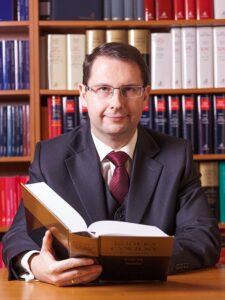The research falls within the scope of the law of succession. This branch of law deals with the way the estate of one person passes to another or others (heirs or beneficiaries) after the death of the former. Since the time of ancient Rome, traditionally – in addition to intestate succession – it is allowed for the testator to appoint during his or her lifetime a person who will inherit his/her estate. This institution of a successor may happen primarily in a will. However, a will lets to appoint only immediate successors (beneficiaries). If a testator dies and his or her estate is acquired by the persons he or she has previously named in his/her will, they become the owners of the assets acquired and can decide what happens to these assets during their lifetime (e.g. by concluding a sales contract with a person of their choice) and after their death (e.g. by drawing up their own will). The original testator may have only some limited possibility to force his/her will on his/her own successor (e.g. by stipulating a condition under which the successor will acquire the property), but he or she can hardly ever exert such influence on subsequent ‘generations’ of successors.
The aim of the project is to research a tool allowing for such a long-term estate planning, namely a private foundation (also sometimes referred to as a family foundation). Traditionally, a foundation is a legal entity that has a publicly beneficial goal defined by the founder and implemented by the foundation’s board (e.g. fighting child malnutrition or supporting an animal species threatened with extinction). A private foundation differs from a traditional, ‘public’ foundation in that its goal may be ‘private’, freely shaped by the founder, without the direct benefit for the general public (e.g. regular providing the founder’s grave with flowers). Polish law so far does not allow to set up private foundations (only ‘public’ foundations can be established), but in 2021 the first draft bill on family foundations appeared and it is expected to change this situation. The issue thus becomes of direct relevance in Poland, too.
Polish law so far does not allow to set up private foundations (only ‘public’ foundations can be established), but in 2021 the first draft bill on family foundations appeared and it is expected to change this situation
The main research objective of the project is to explore how a private foundation can effectively serve as a tool for multi-generational estate planning from comparative perspective. Private foundations exist in legal systems other than the Polish one, e.g. in Austria, Germany, Liechtenstein, and Switzerland. These four regulations will be examined within the framework of the research project. On the one hand, they are similar to each other (they belong to the Germanic stream of the so-called continental legal tradition), on the other hand, they are not identical regarding private foundations. For example, in Germany there is a uniform regulation of foundations, for which either private or public purpose is possible, while the other three countries have regulated a ‘private’ type of foundations separately. Two of these jurisdictions (Germany, Switzerland) have a long tradition of recognizing private (or family) foundations; two others (Austria, Liechtenstein) have adopted specific regulations of Privatstiftungen in recent decades.

The problems that are about to be explored in the comparative analysis will be ordered into a ‘life-cycle’ of a foundation. It pertains to at least three groups of aspects regarding establishing of a foundation (its ‘birth’), operating (its ‘life’), and winding up of a foundation (its ‘death’). Besides deepening the understanding of what a private foundation is and what does ‘multigenerational estate planning’ mean (and how it can be regulated), the project aims to answer the following research questions: “how private foundations can serve to multi-generational estate planning?” and “in what way a private foundation is different—or similar—to parallel legal instruments that can also serve to multi-generational estate planning?”. The Anglo-Saxon trust, fideicomissum originated in ancient Rome, or ‘ordynacja’ once existing in Polish law could be compared with a private foundation. Such an approach may help to evaluate the proposed regulation of a private foundation in Poland or elsewhere not only against the background of other legislation of the same legal instrument (i.e. to answer the question whether the proposed regulation of private foundation has been shaped adequately for the intended purposes), but also against the background of other institutions serving multigenerational estate planning (i.e. to answer the question whether the choice of a private foundation from among other possible instruments was justified).